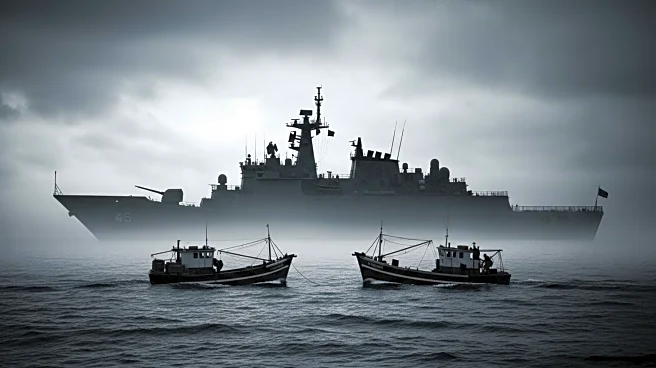What's Happening?
On October 12, 2025, a maritime confrontation occurred near the disputed Thitu Island in the South China Sea, involving Chinese and Philippine vessels. The Philippine Maritime Council accused Chinese maritime forces of using water cannons and ramming a Filipino vessel, causing minor damage. The incident took place as part of a Philippine government program to protect local fishermen. According to Manila's coast guard, three vessels were anchored near the island when Chinese ships approached and used water cannon to intimidate them. An hour later, a Chinese coast guard ship allegedly fired its water cannon directly at a Philippine vessel before ramming its stern. China, however, claimed that two Philippine government vessels illegally entered waters near Sandy Cay, leading to the collision. The disputed area is part of the Spratly Islands, a region with repeated confrontations between the two nations.
Why It's Important?
The incident underscores the ongoing territorial disputes in the South China Sea, a strategic trade route facilitating over $3 trillion in annual ship-borne commerce. The confrontation highlights the geopolitical tensions between China and the Philippines, with potential implications for regional stability and international maritime law. The U.S. Ambassador to the Philippines condemned China's actions, indicating possible diplomatic repercussions. The South China Sea is claimed almost entirely by China, but other nations, including Brunei, Indonesia, Malaysia, the Philippines, and Vietnam, assert claims over portions of the waterway. The escalation of tensions could affect international trade routes and provoke further diplomatic and military responses from involved nations.
What's Next?
The Philippine Maritime Council has vowed to pursue appropriate diplomatic action against China, emphasizing the need to protect Filipino fishermen's livelihood. Manila's authorities plan to continue operations in the area, potentially leading to further confrontations. The international community, including the United States, may increase diplomatic pressure on China to adhere to international maritime laws. The situation could lead to heightened military presence from involved nations, impacting regional security dynamics. Future negotiations or international arbitration may be necessary to resolve the territorial disputes and prevent further incidents.
Beyond the Headlines
The incident raises questions about the enforcement of international maritime law and the role of global powers in mediating regional conflicts. The South China Sea dispute involves complex legal, ethical, and environmental dimensions, with implications for global trade and security. The confrontation may influence future diplomatic strategies and alliances in the Asia-Pacific region, affecting long-term geopolitical stability. The protection of local fishermen's rights and livelihoods remains a critical issue, highlighting the human impact of territorial disputes.










